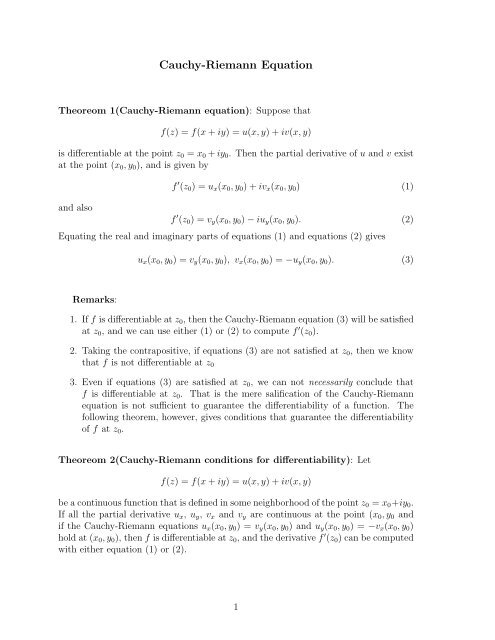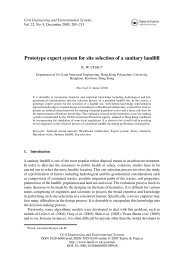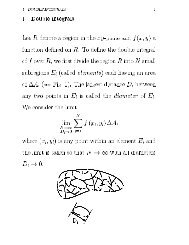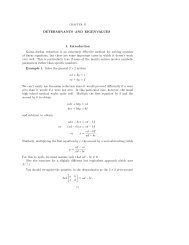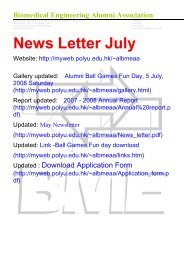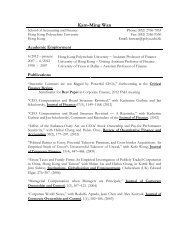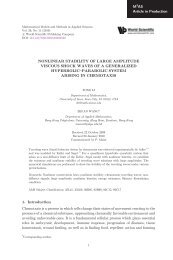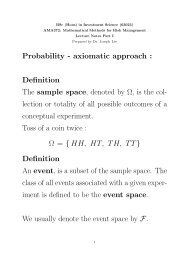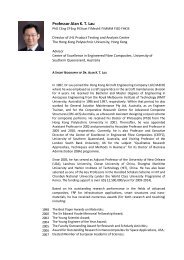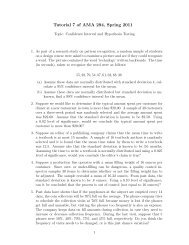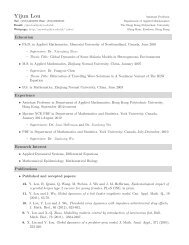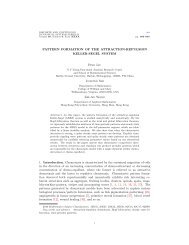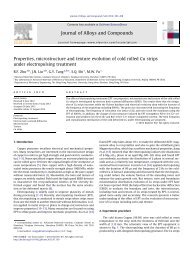Cauchy-Riemann Equation
Cauchy-Riemann Equation
Cauchy-Riemann Equation
Create successful ePaper yourself
Turn your PDF publications into a flip-book with our unique Google optimized e-Paper software.
<strong>Cauchy</strong>-<strong>Riemann</strong> <strong>Equation</strong><br />
Theoreom 1(<strong>Cauchy</strong>-<strong>Riemann</strong> equation): Suppose that<br />
f(z) = f(x + iy) = u(x, y) + iv(x, y)<br />
is differentiable at the point z 0 = x 0 + iy 0 . Then the partial derivative of u and v exist<br />
at the point (x 0 , y 0 ), and is given by<br />
and also<br />
f ′ (z 0 ) = u x (x 0 , y 0 ) + iv x (x 0 , y 0 ) (1)<br />
f ′ (z 0 ) = v y (x 0 , y 0 ) − iu y (x 0 , y 0 ). (2)<br />
Equating the real and imaginary parts of equations (1) and equations (2) gives<br />
u x (x 0 , y 0 ) = v y (x 0 , y 0 ), v x (x 0 , y 0 ) = −u y (x 0 , y 0 ). (3)<br />
Remarks:<br />
1. If f is differentiable at z 0 , then the <strong>Cauchy</strong>-<strong>Riemann</strong> equation (3) will be satisfied<br />
at z 0 , and we can use either (1) or (2) to compute f ′ (z 0 ).<br />
2. Taking the contrapositive, if equations (3) are not satisfied at z 0 , then we know<br />
that f is not differentiable at z 0<br />
3. Even if equations (3) are satisfied at z 0 , we can not necessarily conclude that<br />
f is differentiable at z 0 . That is the mere salification of the <strong>Cauchy</strong>-<strong>Riemann</strong><br />
equation is not sufficient to guarantee the differentiability of a function. The<br />
following theorem, however, gives conditions that guarantee the differentiability<br />
of f at z 0 .<br />
Theoreom 2(<strong>Cauchy</strong>-<strong>Riemann</strong> conditions for differentiability): Let<br />
f(z) = f(x + iy) = u(x, y) + iv(x, y)<br />
be a continuous function that is defined in some neighborhood of the point z 0 = x 0 +iy 0 .<br />
If all the partial derivative u x , u y , v x and v y are continuous at the point (x 0 , y 0 and<br />
if the <strong>Cauchy</strong>-<strong>Riemann</strong> equations u x (x 0 , y 0 ) = v y (x 0 , y 0 ) and u y (x 0 , y 0 ) = −v x (x 0 , y 0 )<br />
hold at (x 0 , y 0 ), then f is differentiable at z 0 , and the derivative f ′ (z 0 ) can be computed<br />
with either equation (1) or (2).<br />
1
Theoreom 3(fundamental theorem characterizing complex functions): Let<br />
Ω ∈ C be an open set. The following properties are equivalent:<br />
(a) The function f(z) has a continuous complex derivative f ′ (z) for all z ∈ Ω;<br />
(b) The real and imaginary parts of f(z) have continuous partial derivative and<br />
satisfy the <strong>Cauchy</strong>-<strong>Riemann</strong> equations (3) in Ω;<br />
(c) The function f(z) is analytic for all z ∈ Ω, and so is the differentiable and has<br />
a convergent power series expansion as each point z 0 ∈ Ω. The radius of convergence<br />
ρ is at least as large as the distance from z 0 to the boundary ∂Ω.<br />
Definition of Analytic. We say that the complex function f is analytic at the point<br />
z 0 if there is some ε > 0 such that f ′ (z) exists for all z ∈ D ε (z 0 ). In other words, f<br />
must be differentiable not only at z 0 , but also at all points in some ε neighborhood of<br />
z 0 .<br />
2


